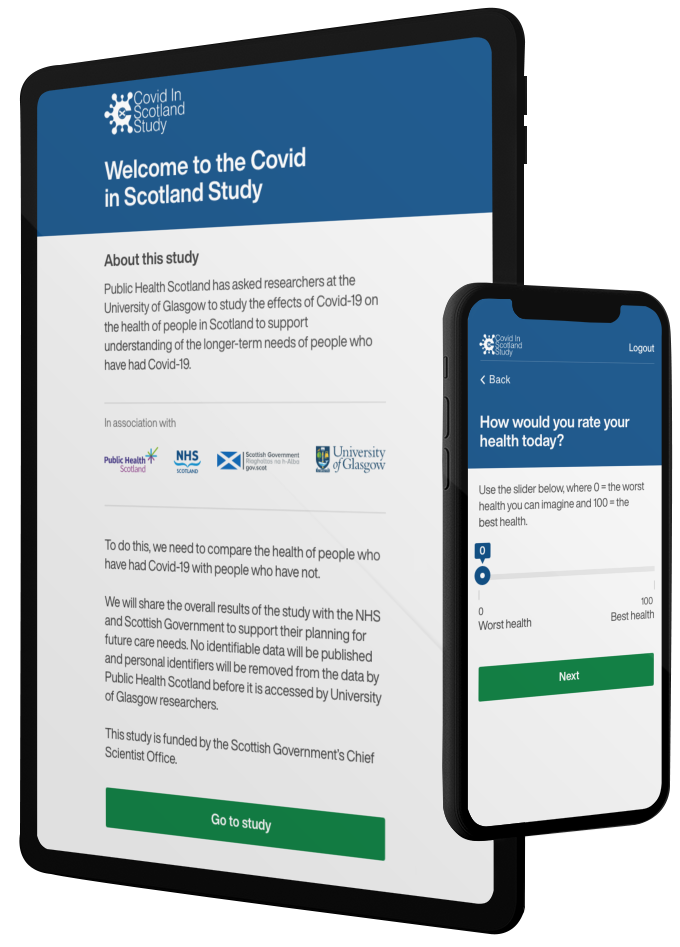Covid in Scotland Study
A study into the long term effects of COVID-19 on the people of Scotland
In association with:

About this study
The COVID in Scotland Study (CISS) aimed to identify the effects of Covid-19 on the health of people in Scotland. We wanted to find out how many people continue to be unwell after having Covid-19, what their symptoms are, and how it affects their lives. Participants were recruited between May 2021 and November 2022. The study is now closed.
Key findings
- At 6 months or more after symptomatic infection, 48% of participants reported not being fully recovered.
- The symptoms of long-COVID vary, but the most common are tiredness, headache, muscle aches/weakness, difficulty sleeping, and breathlessness.
- The risk of long-COVID is greater in people who had to be hospitalised for their COVID infection, women, people living in deprived areas and those with pre-existing health conditions (especially multimorbidity), and absent following asymptomatic infection.
- The ‘true’ prevalence of long-COVID (percentage of people who had one or more symptom that would not have occurred anyway) was 6.6%, 6.4% and 10.3% at 6-, 12- and 18-month follow-up.
- Interviews with participants living with long COVID identified the devasting effect it has on lives, with detrimental impacts on finances, careers, relationships and mental health.
- Repeat interviews 6 months later identified fatigue, breathlessness, and brain fog as common enduring symptoms and effective treatments elusive.
What did the study involve?
CISS used the Scottish PCR test result database to identify and invite every adult in Scotland who had had a positive PCR test for COVID-19 and a comparison group of people who had a negative test only. We included existing cases and added new cases as they occurred, and a total of 257,341 people participated. Study participants completed questionnaires at 6, 12, 18, and 24 month follow-up. We also linked this information to their routine health data on medications, hospital admissions and deaths.
Participants also consented, if they wished, to recruitment to the embedded qualitative study. Forty-five people were interviewed; eighteen were reinterviewed 6 months later. Overall, we interviewed 24 men, 21 women with most aged 40 and over.
The University of Glasgow, College of Medical, Veterinary and Life Sciences PPIE (Patient and Public Involvement and Engagement) and COVID-19 PPIE groups contributed to study design, recruitment, and interpretation of results.
Publications
You can read more about the study and its results in the following publications:
- Hastie CE, Lowe DJ, McAuley A, Winter AJ, Mills NL, Black C, Scott JT, O'Donnell CA, Blane DN, Browne S, Ibbotson TR, Pell JP. Outcomes among confirmed cases and a matched comparison group in the Long-COVID in Scotland study. Nat Commun. 2022 Oct 12;13(1):5663. doi: 10.1038/s41467-022-33415-5.
- Hastie CE, Lowe DJ, McAuley A, Mills NL, Winter AJ, Black C, Scott JT, O'Donnell CA, Blane DN, Browne S, Ibbotson TR, Pell JP. Natural history of long-COVID in a nationwide, population cohort study. Nat Commun. 2023 Jun 13;14(1):3504. doi: 10.1038/s41467-023-39193-y.
- Hastie CE, Lowe DJ, McAuley A, Mills NL, Winter AJ, Black C, Scott JT, O'Donnell CA, Blane DN, Browne S, Ibbotson TR, Pell JP. True prevalence of long-COVID in a nationwide, population cohort study. Nat Commun. 2023 Nov 30;14(1):7892. doi: 10.1038/s41467-023-43661-w.
https://www.nature.com/articles/s41467-022-33415-5
https://www.nature.com/articles/s41467-023-39193-y



